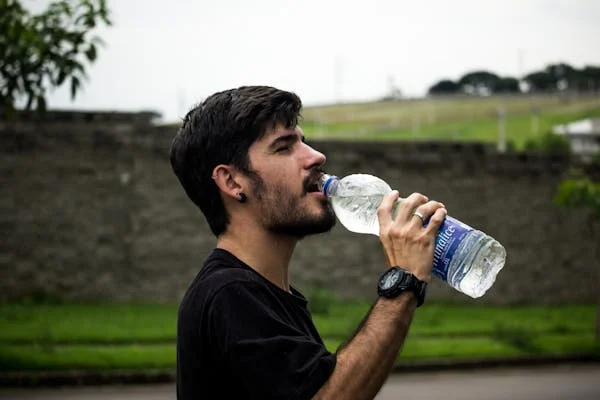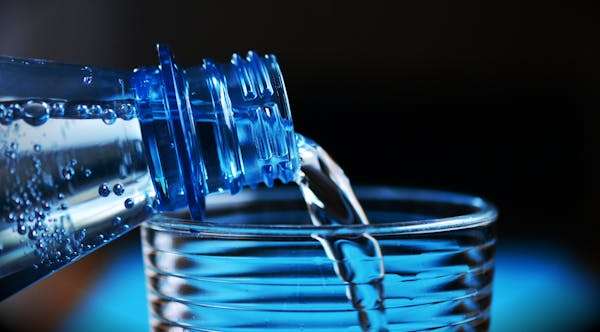It is imperative for new mothers to maintain adequate water, particularly during the taxing stage of nursing. Understanding how to stay hydrated while breastfeeding improves your personal health, but it also affects your baby’s development of milk and general well-being.
Underestimating their fluid requirements can cause dehydration and have an impact on the amount of milk produced by nursing moms. We’ll go over useful tactics and helpful hints in this guide to assist you stay well-hydrated during your nursing experience.

This post seeks to equip you with the knowledge you need to prioritize self-care and make sure you and your baby thrive, from busting myths about water intake to useful hydration techniques.
Health Benefits of Staying Hydrated:
Proper hydration plays a pivotal role in supporting the health and well-being of breastfeeding mothers. Understanding how to stay hydrated while breastfeeding is essential due to its numerous benefits:
- Optimal Milk Production: Adequate hydration is crucial for maintaining sufficient milk supply. Breast milk is composed of approximately 88% water, making hydration directly linked to its production volume and quality. By drinking enough water, you ensure that your body can produce the necessary fluids for your baby’s nutrition.
- Postpartum Recovery: Staying hydrated aids in quicker recovery postpartum. Dehydration can exacerbate fatigue and hinder the body’s ability to heal after childbirth. Ample fluids help replenish lost fluids during labor and delivery, promoting faster healing of tissues and organs.
- Overall Health and Well-being: Hydration supports bodily functions such as digestion, circulation, and temperature regulation, which are particularly important during the postpartum period. It helps prevent constipation, reduces the risk of urinary tract infections (UTIs), and supports immune function, all of which contribute to overall well-being.
- Energy Levels and Mental Clarity: Dehydration can lead to feelings of tiredness and difficulty concentrating, affecting your ability to care for yourself and your baby. Maintaining hydration levels ensures optimal energy levels and mental clarity, helping you stay alert and focused.
Understanding these benefits underscores the importance of prioritizing hydration throughout your breastfeeding journey. By adopting practical strategies and being mindful of your fluid intake, you can enhance both your own health and your breastfeeding experience.
How Much Water is Enough?
Determining the right amount of water to drink while breastfeeding is crucial for maintaining hydration and supporting milk production. Understanding how to stay hydrated while breastfeeding involves considering several factors:

- Daily Water Intake Recommendations: Experts generally recommend that breastfeeding mothers consume more water than usual to compensate for fluid loss during lactation. The Institute of Medicine suggests an additional 32 ounces (about 1 liter) of water per day beyond the typical daily intake for women, which is around 8-10 cups (2-2.5 liters) of fluids daily.
- Factors Influencing Hydration Needs: Your individual hydration needs can vary based on factors such as climate, activity level, and personal metabolism. Hotter climates or increased physical activity may require you to drink more water to stay adequately hydrated.
- Monitoring Hydration Levels: Pay attention to your body’s cues for thirst, as well as the color and frequency of your urine. Pale yellow urine usually indicates adequate hydration, while darker urine may suggest dehydration.
- Hydrating Foods: In addition to water, consuming hydrating foods such as fruits (e.g., watermelon, and oranges) and vegetables (e.g., cucumber, and celery) can contribute to your overall fluid intake.
By understanding these recommendations and factors, you can better gauge your hydration needs and ensure you’re providing enough fluids to support both your own health and your breastfeeding journey effectively. Regularly assessing and adjusting your fluid intake based on these guidelines can help optimize your breastfeeding experience.
Practical Tips for Staying Hydrated:
Maintaining adequate hydration is essential for breastfeeding mothers, but it can sometimes be challenging amidst the demands of caring for a newborn. Here are practical strategies for understanding how to stay hydrated while breastfeeding:

- Carry a Water Bottle: Keep a reusable water bottle with you at all times, whether you’re at home, running errands, or out for a walk. Keeping water easily accessible encourages regular sipping throughout the day.
- Set Reminders: With the busyness of caring for a baby, it’s easy to forget to drink water. Set alarms or reminders on your phone to prompt you to take regular sips of water, especially before and after breastfeeding sessions.
- Hydrating Foods: Incorporate foods with high water content into your diet. Fruits like watermelon, oranges, and strawberries, as well as vegetables like cucumber and celery, not only provide hydration but also essential nutrients.
- Monitor Intake: Keep track of your daily water intake using a water tracking app or a simple journal. This helps you stay accountable and ensures you’re meeting your hydration goals.
- Hydration During Feeding Times: Make it a habit to drink a glass of water each time you breastfeed. This not only helps you stay hydrated but also supports milk production.
- Stay Cool: In warmer weather, or if you tend to feel overheated during breastfeeding, prioritize staying cool and drinking extra water to prevent dehydration.
By implementing these practical tips, you can effectively manage your hydration needs while breastfeeding, supporting both your own health and the quality of your breast milk. Consistency and mindfulness in hydration habits can make a significant difference in your overall well-being during this special time.
Hydration Myths and Facts:
Navigating through myths and facts about hydration is essential for breastfeeding mothers to understand how to stay hydrated while breastfeeding effectively:
- Myth: You Only Need to Drink Water When You’re Thirsty
- Fact: While thirst is a signal of dehydration, breastfeeding mothers should proactively drink water throughout the day. Waiting until you’re thirsty may lead to dehydration, impacting milk supply and overall health.
- Myth: Drinking More Water Increases Milk Supply
- Fact: While hydration is important, there’s no direct evidence that excessive water intake boosts milk production. Maintaining adequate hydration is crucial, but excessive fluid intake won’t necessarily increase milk supply beyond what’s already required for hydration and bodily functions.
- Myth: Caffeine Dehydrates You
- Fact: Moderate caffeine consumption (e.g., one to two cups of coffee per day) doesn’t significantly dehydrate breastfeeding mothers. However, excessive caffeine intake can have diuretic effects, so moderation is key.
- Myth: Hydration Only Comes from Water
- Fact: While water is the primary source of hydration, other fluids like herbal teas, milk, and even fruits and vegetables contribute to overall hydration levels.
- Myth: Dark Urine Always Indicates Dehydration
- Fact: While dark urine can be a sign of dehydration, certain foods, medications, and vitamins can also affect urine color. Monitoring urine frequency and overall hydration habits provides a clearer picture of hydration status.
By debunking these myths and understanding the facts, breastfeeding mothers can make informed decisions about their hydration needs.
It’s important to prioritize regular, moderate fluid intake and listen to your body’s cues to maintain optimal hydration levels throughout the breastfeeding journey.
Additional Tips for Optimal Hydration:
Maintaining adequate hydration while breastfeeding requires attention to detail and consistency. Here are some additional strategies to consider for understanding how to stay hydrated while breastfeeding effectively:
- Use a Hydration Tracker: Apps or journals can help monitor daily water intake, ensuring you meet recommended hydration goals. This tool can be particularly useful during the busy and often forgetful early stages of motherhood.
- Invest in a Quality Water Bottle: Choose a water bottle that’s convenient and encourages regular drinking. Look for features like large capacity, easy cleaning, and insulation to keep water at a desirable temperature throughout the day.
- Alternate Hydration Sources: While water is essential, consider incorporating other hydrating beverages such as herbal teas or diluted fruit juices. These can add variety and flavor while contributing to overall fluid intake.
- Mindful Drinking Habits: Instead of chugging water sporadically, sip steadily throughout the day. This approach helps maintain hydration levels more consistently and supports milk production.
- Seek Support: Discuss hydration concerns with a healthcare provider or lactation consultant, especially if you have specific medical conditions or concerns about milk supply. They can provide personalized advice and address any hydration-related issues.
- Self-Care Reminder: Remember that staying hydrated is not only beneficial for milk production but also supports your overall health and energy levels during this demanding time.
By incorporating these additional tips into your daily routine, you can enhance your hydration practices and ensure both you and your baby benefit from optimal hydration levels throughout the breastfeeding journey.
Conclusion:
In conclusion, understanding how to stay hydrated while breastfeeding is vital for both maternal health and successful breastfeeding outcomes. By adopting practical tips, debunking myths, and staying mindful of hydration needs, breastfeeding mothers can ensure they’re providing optimal care for themselves and their babies.
Remember, consistent hydration supports milk production, aids postpartum recovery, and enhances overall well-being. Prioritizing hydration is a simple yet powerful way to nurture yourself during this special journey of motherhood. Click to learn more.
FAQs:
How much water should I drink while breastfeeding?
It’s recommended to drink about 8-10 cups (2-2.5 liters) of fluids per day, in addition to listening to your body’s thirst cues. Factors like climate and activity level can influence your hydration needs.
Are there other beverages besides water that can help me stay hydrated?
Yes, besides water, you can drink herbal teas, diluted fruit juices, and milk to stay hydrated. Simply be aware of the added sugars and caffeine content in certain beverages.
Does dehydration affect milk supply?
Yes, dehydration can impact milk production. Ensuring adequate hydration supports optimal milk supply and quality.
How can I tell if I’m drinking enough water?
Checking the color of your urine can serve as a helpful indicator. Pale yellow urine suggests proper hydration, while darker urine may signal dehydration.
Are there foods that can help with hydration?
Yes, fruits like watermelon, and oranges, and vegetables like cucumber and celery have high water content and contribute to overall hydration levels.
